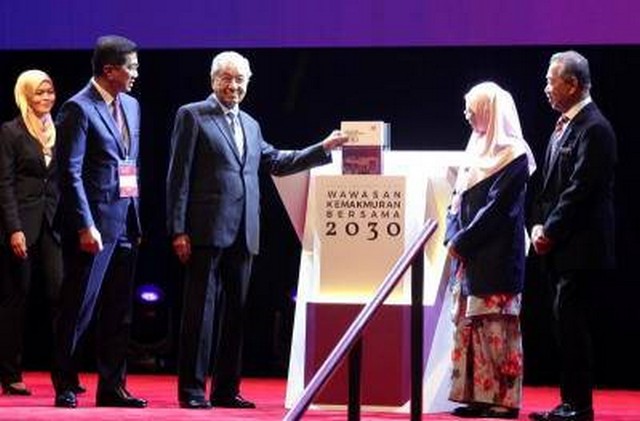By Chandra Muzaffar
While presenting the Shared Prosperity Vision (SPV) 2030 to the people, Prime Minister Tun Dr Mahathir Mohamad highlighted two major challenges facing the nation —- corruption and socio-economic disparities. He argued that corruption and abuse of power had stunted Malaysia’s development and the equitable distribution of its economic pie. Rural-Urban disparities; regional disparities; disparities between classes; and disparities among ethnic communities have also hampered and hindered our progress. If the government and the people can concentrate upon these two challenges in the next decade, SPV 2030 would be attainable.
It is significant that even before the launching of SPV 2030 on 5th October 2019, the Pakatan Harapan(PH) government had already initiated a number of measures to combat corruption. Enhancing the independence of the Anti-Corruption Commission would be one of them. Requiring all PH legislators to declare their assets and liabilities to the people would be another positive move. A law that would underscore transparency and accountability in political and electoral financing is in the offing. This would undoubtedly curb the scourge of money politics. It is money politics which began in Sabah in the seventies and worsened in the Peninsula in the eighties and nineties that is partly responsible for the rapid decline of ethics in public life.
There is much more to be done in the battle against graft. Very few concrete measures have been taken to curb the pervasive agent/proxy culture in procurement exercises. Close kith and kin of those who wield executive power have yet to be barred from bidding for state contracts.
Firm, uncompromising action against those who may have strayed from the straight and narrow, though better than before, has still to become the norm. The tendency to avoid harsh, punitive action against the wrongdoer persists. This sometimes deteriorates into attempts to cover up obvious flaws and foibles of personnel in public institutions. Cover-ups are also known to occur when public officials are bribed by individuals pursuing their own private agendas.
It is partly because these negative attitudes continue to express themselves that rooting out corruption in Malaysia is a herculean task. If it can be reduced significantly by 2030, it would be a magnificent achievement. Individuals at all levels of society and all institutions in the public and private sectors should make this their mission. The national leadership in particular should set the right example for the rest of the citizenry by adhering to the highest standards of moral rectitude.
In addressing the challenge of socio-economic disparities, the first task of the government is to re-define the National Poverty Line ( NPL). The current official poverty rate does not reflect realities on the ground. It appears that poverty is more widespread than what government statistics suggest which is why it makes sense to adopt a Multi-Dimensional Poverty Index (MPI) that takes into account factors such as health, education, consumption patterns and household demographics. The SPV 2030 also emphasises the importance of enhancing vocational and technical skills. Our failure to do so should be understood in the larger context of our inability to develop a strong base in mathematics and science in our education system — a vital prerequisite for any society that seeks to industrialise.
While the spread of science and skills will help to reduce disparities, there should be a more determined drive to generate new high income economic activities, harness new sources of wealth and institute new forms of economic and social organisation that will raise the standard of living of the majority. Research and Development (R&D) will undoubtedly play a major role in all this and should focus upon our own rich biodiversity. Shouldn’t we also re-visit the role of cooperatives as a mechanism in the production, distribution and consumption of goods and services especially since we are grappling with the challenge of containing escalating cost of living? At the same time, we should ask whether it would ever be possible to narrow socio-economic disparities in Malaysia or any other society for that matter if we do not also curb the excessive accumulation of wealth by a tiny minority? In other words, shouldn’t we contemplate the introduction of a wealth tax of sorts that targets the super-rich?
There should be constant monitoring of the implementation of SPV 2030. The rakyat should be informed from time to time of the progress made in combating corruption and reducing disparities. Vision 2020 was not subjected to constant public evaluation and analysis. True, there was a major review in 1996 five years after the Vision was announced but in the last 23 years there has been no attempt to examine the implementation of the Vision’s 9 strategic challenges. One hopes that SPV 2030 will not meet the same fate.
Even more important, we should appraise SPV 2030 within the framework of our national philosophy, the Rukunegara. Whether visions and programmes with specific timelines help to further the aspirations of the Rukunegara and strengthen its principles should be on the radar of the government and the people all the while. For instance if the goal of ‘shared prosperity’ is accomplished it would make the Rukunegara’s aspiration of a ‘just society’ much more meaningful just as success in fighting corruption and narrowing disparities will embellish the Rukunegara’s fourth principle, the rule of law.
In this regard, it is significant that His Majesty the Yang di-Pertuan Agong, Al-Sultan Abdullah Ri’ayatuddin Al-Mustafa Billah Shah, has on a number of occasions recently called upon the leaders and the people to make the Rukunegara their guide. It is time that we heed his advice. The federal Parliament for instance can adopt a simple resolution to that effect in its next session.
Kuala Lumpur.
11 October 2019.

